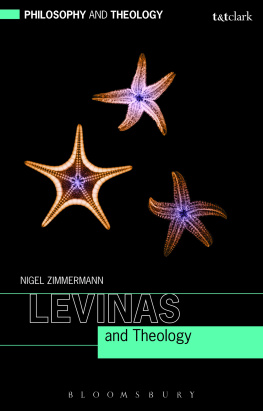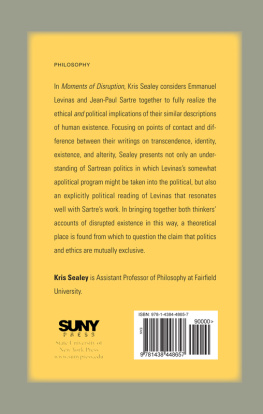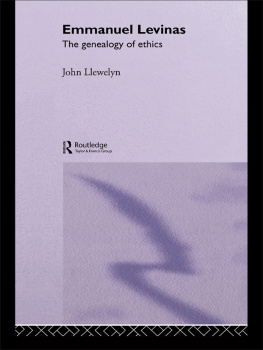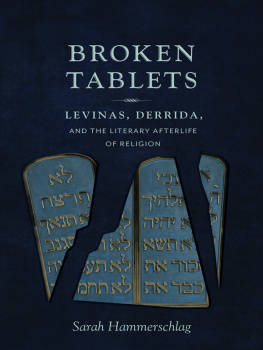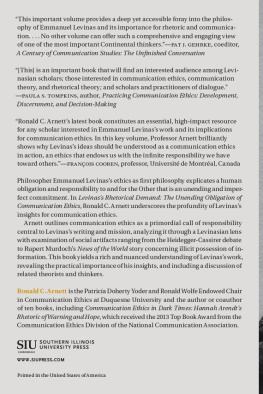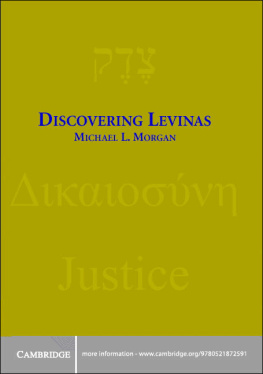Levinas and Theology
Philosophy and Theology series
Other titles in the Philosophy and Theology series include:
Adorno and Theology , Christopher Craig Brittain
Badiou and Theology , Frederiek Depoortere
Derrida and Theology , Steven Shakespeare
Foucault and Theology , Jonathan Tran
Girard and Theology , Michael Kirwan
Habermas and Theology , Maureen Junker-Kenny
Hegel and Theology , Martin J. De Nys
Kant and Theology , Pamela Sue Anderson and Jordan Bell
Kierkegaard and Theology , Murray Rae
Nietzsche and Theology , Craig Hovey
Vattimo and Theology , Thomas G. Guarino
Wittgenstein and Theology , Tim Labron
iek and Theology , Adam Kotsko
Levinas and Theology
Nigel Zimmermann

Bloomsbury T&T Clark
An imprint of Bloomsbury Publishing Plc
| 50 Bedford Square | 175 Fifth Avenue |
| London | New York |
| WC1B 3DP | NY 10010 |
| UK | USA |
www.bloomsbury.com
First published 2013
Nigel Zimmermann, 2013
All rights reserved. No part of this publication may be reproduced or transmitted in any form or by any means, electronic or mechanical, including photocopying, recording, or any information storage or retrieval system, without prior permission in writing from the publishers.
Nigel Zimmermann has asserted his right under the Copyright, Designs and Patents Act, 1988, to be identified as Author of this work.
No responsibility for loss caused to any individual or organization acting on or refraining from action as a result of the material in this publication can be accepted by Bloomsbury Academic or the author.
British Library Cataloguing-in-Publication Data
A catalogue record for this book is available from the British Library.
ePub ISBN: 978-1-472-55458-1
Library of Congress Cataloging-in-Publication Data
Zimmermann, Nigel
Levinas and Theology/Nigel Zimmermann p.cm
Includes bibliographic references and index.
ISBN 978-0-567-60652-5 (hardcover) ISBN 978-0-567-24867-1 (pbk.)
2012045678
Typeset by Deanta Global Publishing Services, Chennai, India
Contents
It is a privilege to contribute to this book series, in which various philosophers are introduced to theologians. It is more than an introduction, but it cannot be said to form a comprehensive review. Only key ideas can be highlighted in such a book, but they have nonetheless been thought through with sensitivity to Levinas thought, which is deemed only fitting. Levinas does not offer the kind of systematic writing that lends itself to unambiguous clarity and order. He writes to issue an appeal to his readers on philosophical grounds. His is the conspicuously French approach that undertakes a provocation in the mind of the reader. I have sought to explain the nature of this provocation as it pertains to the theological task, and no doubt there will be theologians who take offence, or deem Levinas an unwelcome dialogue partner. This raises the question of the nature and mission of theology, and such a point of conjecture is an argument worth having. Indeed, I do not propose that Levinas be a partner to theology analogous to marriage, or some equally thoroughgoing commitment. Rather, Levinas may be a partner for the purposes of something like a dance; the foxtrot for example. This better conjures the nature of a partnership that might be thrilling, challenging, colourful and robust. It is more than flirtation, and less than a formal commitment, but with all the excitement of an act that is fast, rigorous and performed in the full public glare of the ballroom lights.
For the theologian, there are of course perplexing challenges in the work of Levinas, and there are also fruitful opportunities. Specifically, this book defends the fruitfulness of theologians taking from Levinas the provocative turn towards alterity within the context of inter-subjectivity. The turn towards alterity is, as Levinas insists, an ethical moment. Otherness is not laid bare like the flat surface of a holiday postcard, but is a dynamic experience of difference in human affairs. It has a universal significance and theology is not to be quietly excused from such a discovery. As I argue, such a turn challenges theology to regain the en-wondered sense of ethical import in the face of the other, and to sober up in the bright sunlight of truths appearing. In this sense, it is a very public and indeed social fruit that is cultivated.
Theologians are, therefore, challenged to consider carefully their vocation. The self-identification of the God of the Hebrew Scriptures in the person of Christ ought to provoke in the theologian cautious self-inspection. In Christ, the same alterity that raised the prophets and took claim upon the people of Israel is given in the warm flesh of frail humanity. It is a paradoxical realization of alterity in that its claim is both a strong one, even as it sits radically open to the violence of the world. In the New Testament, examples of Gods glory (the Transfiguration, the miracles, the Resurrection) contrast with Christs passion and crucifixion, and the tragic humanity of a narrative that includes loss, heartbreak, death and loneliness. The cross of Golgotha must have its place in the terrain of Christian theology, or else it cannot be a Christian theology at all. This is a conviction the Reformers perceived correctly; that a theologia crucis does not destroy the divine claims of Christ, but reveals his divinity in a significant way. In the New Testament, the divine claim of Christ is continually linked to the God of Abraham, Isaac and Jacob (see Acts 3:13). In other words, the law of the old reaches a new threshold in the personification of Gods action in Christ: For the law was given through Moses; grace and truth came through Jesus Christ (John 1:17).
I recognize that to link the claims above to the Levinasian purchase upon alterity in the face of the other person is to embark upon a certain risk. It risks both the integrity of Christian theology and the nuance of Levinas work. Having recognized the risk, I do, however, maintain that the integrity of theology is only strengthened and fortified by a hospitable encounter with Levinas, and that the philosopher can be read carefully and rigorously, and often critically. This book cannot detail every nuance and variable notion that makes an appearance in Levinas work. Moreover, it falls outside its remit for this book to attempt a full and probing account of Levinas entire corpus, or its place in the history of philosophy. Other thinkers are progressing in these important tasks already. Rather, this book thinks through Levinas from a theological perspective, and gives an account of how theologians have already handled his challenging thought. It is written with a debt to those theologians who are already wrestling with him, and I sincerely apologize to those who have been overlooked or dealt with in a limited fashion. Time and space are authentic limitations. Given the target audience of an English-speaking readership, attention has been granted to Levinas commentators who are English-language writers or translated into English, and therefore widely available.
Much has been written already on the philosophy of Levinas. Less so on his theology, or perhaps more accurately, where theology finds itself after Levinas. A number of important texts will be looked at in this book which, in various ways, have attempted to rectify this aporia in contemporary theology. Chiefly however, I will pursue the following objectives:
- Indicate the essential contours of Levinas thought as they relate to the concerns of theology; especially in their permutations concerning God, revelation and religion.
Next page
